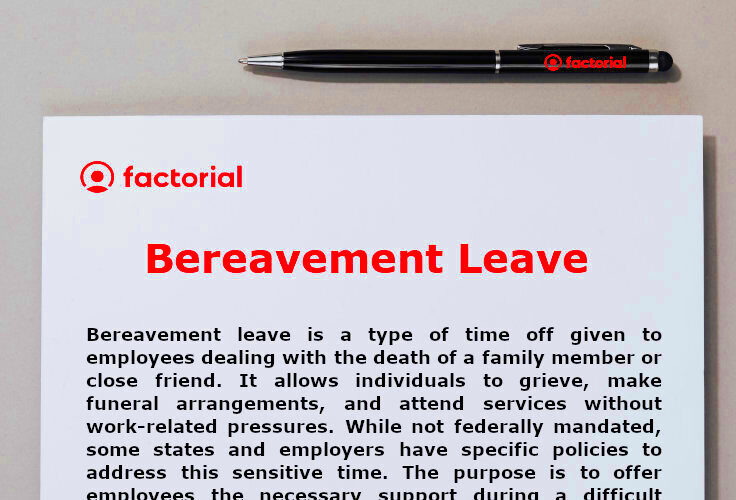Understanding Iowa Bereavement Leave Law
Iowa’s bereavement leave law provides employees with the opportunity to take time off work to grieve the loss of a loved one. This law recognizes the emotional and logistical challenges that come with such a loss and aims to support employees during this difficult time. Understanding the specifics of this law can help both employers and employees navigate the process effectively.
Definition of Bereavement Leave

Bereavement leave is a specific type of leave granted to employees following the death of a family member or loved one. This leave allows individuals to take the necessary time off work to mourn, make funeral arrangements, and attend memorial services. In Iowa, bereavement leave may not be mandated by law for all employers, but many choose to offer it as part of their employee benefits.
Here are some key points about bereavement leave:
- Purpose: To provide time for grieving and attending to related responsibilities.
- Duration: Varies by employer policy, but often includes a few days off.
- Paid vs. Unpaid: Can be paid or unpaid, depending on company policy.
Eligibility for Bereavement Leave in Iowa
Eligibility for bereavement leave in Iowa typically depends on an employer’s policies, as there are no state laws mandating bereavement leave for private employers. However, many companies choose to provide it to support their employees. Here are some factors that can affect eligibility:
- Employment Status: Full-time employees are more likely to qualify than part-time employees.
- Length of Employment: Some employers require a minimum period of employment before granting leave.
- Relationship to the Deceased: Most policies specify which relatives qualify, such as parents, siblings, spouses, or children.
It’s essential for employees to check their employer’s specific bereavement leave policy to understand their rights and options fully. Employers should also communicate their policies clearly to avoid any confusion among staff.
Duration of Bereavement Leave
The duration of bereavement leave in Iowa can vary widely depending on the employer’s policy. Unlike some other types of leave, there is no specific law that dictates how long bereavement leave must be. This means each company may have its own approach, and it’s important for employees to understand what is offered by their employer.
Generally, bereavement leave can range from a few days to over a week. Here are some common practices:
- Immediate Family: Employees often receive about 3 to 5 days off for the death of an immediate family member, such as a parent, child, or spouse.
- Extended Family: Leave for the death of extended family members, such as grandparents or aunts and uncles, may be shorter, typically 1 to 3 days.
- Additional Leave: Some employers may offer additional unpaid leave if more time is needed.
It’s worth noting that some organizations may also provide flexible options, allowing employees to take time off as needed over a longer period. Employees should feel encouraged to discuss their specific needs with their employers to ensure they receive adequate support during this challenging time.
Employer Responsibilities Under Iowa Law
While Iowa law does not require employers to provide bereavement leave, those who choose to do so have certain responsibilities. Employers should establish clear policies regarding bereavement leave to ensure fairness and transparency. Here are some key responsibilities:
- Policy Development: Employers should create a written policy outlining the specifics of bereavement leave, including eligibility, duration, and pay status.
- Communication: It’s crucial for employers to communicate their bereavement leave policies clearly to all employees. This can be done through employee handbooks or orientation sessions.
- Consistency: Employers must apply their bereavement leave policies consistently to all employees to avoid potential discrimination claims.
- Flexibility: Where possible, employers should be flexible with employees’ needs during a difficult time, recognizing that each person’s grieving process is unique.
By fulfilling these responsibilities, employers can create a supportive work environment that acknowledges the emotional needs of their employees.
Employee Rights Regarding Bereavement Leave
Employees have certain rights when it comes to bereavement leave, even if it is not mandated by law in Iowa. Understanding these rights can help employees advocate for themselves during a challenging time. Here are some important points to consider:
- Right to Information: Employees have the right to know their employer’s policies regarding bereavement leave, including how to request it and what documentation may be required.
- Requesting Leave: Employees should feel empowered to request bereavement leave as needed, and employers should honor these requests in line with their policies.
- Non-Retaliation: Employers cannot retaliate against employees for taking bereavement leave or asking about their rights. This includes adverse actions such as demotion or termination.
- Job Protection: While bereavement leave is typically not protected under the Family and Medical Leave Act (FMLA), some employers may offer job protection as part of their policy.
Employees should feel comfortable discussing their needs with their employers and understanding their rights can help ensure they receive the support they require during a difficult time.
How to Request Bereavement Leave
Requesting bereavement leave can feel daunting, especially during a difficult time. However, knowing the steps can make the process smoother. Here’s a simple guide to help you navigate the request:
- Review Company Policy: Before making a request, check your employer’s bereavement leave policy in the employee handbook or online resources. This will give you an understanding of the procedures and any documentation needed.
- Notify Your Supervisor: As soon as you are able, inform your immediate supervisor about your situation. A quick email or phone call can suffice. Be clear but brief about the need for leave.
- Submit a Formal Request: Depending on your company’s policy, you may need to fill out a formal leave request form. Ensure you include the dates you intend to be away and any specific details required by your employer.
- Provide Documentation: Some employers may ask for documentation, such as a death certificate or obituary. Have this ready if it’s required, but don’t stress if it’s not asked for.
- Follow Up: If you don’t receive confirmation of your request, don’t hesitate to follow up with HR or your supervisor to ensure everything is processed smoothly.
Remember, it’s perfectly okay to ask for the time you need. Your well-being during this period is important, and most employers understand this.
FAQs About Iowa Bereavement Leave Law
Here are some frequently asked questions regarding Iowa’s bereavement leave law to help clarify common concerns:
- Is bereavement leave required by law in Iowa? No, Iowa law does not require employers to provide bereavement leave, but many do offer it as a benefit.
- How much time off can I take? The duration of bereavement leave varies by employer, typically ranging from a few days for immediate family to less for extended family.
- Can I take unpaid leave? If your employer does not provide paid bereavement leave, you can request unpaid leave, but this is at the discretion of your employer.
- What if my employer doesn’t have a bereavement policy? If there is no formal policy, it’s still worthwhile to discuss your situation with your supervisor, as they may be willing to grant leave.
- Are there any protections for taking bereavement leave? While there are no specific legal protections in Iowa for bereavement leave, retaliation for taking time off is generally prohibited.
These FAQs can provide clarity on bereavement leave in Iowa and help you feel more prepared to handle your situation.
Conclusion on Understanding Iowa Bereavement Leave Law
Understanding Iowa’s bereavement leave law is crucial for both employees and employers. While the law does not mandate bereavement leave, many companies recognize the importance of allowing employees to take time off to grieve. Employees should feel empowered to request leave and understand their rights and the company’s policies.
For employers, establishing clear bereavement leave policies can foster a supportive workplace environment, helping employees navigate difficult times with compassion and understanding. Remember, open communication is key. If you are in a situation where you need bereavement leave, don’t hesitate to reach out to your employer for the support you deserve.
In summary, being informed about your rights and responsibilities surrounding bereavement leave can make a significant difference in managing the emotional challenges that come with losing a loved one.


